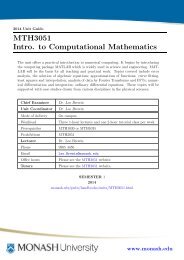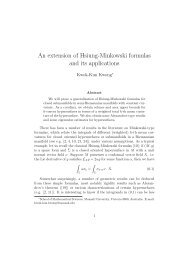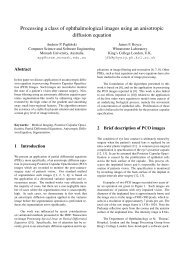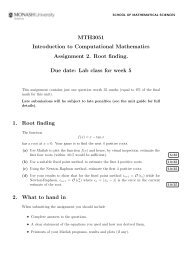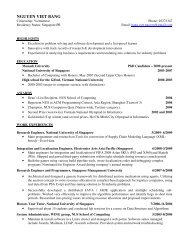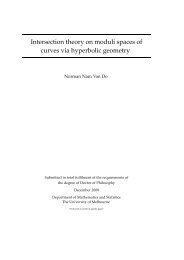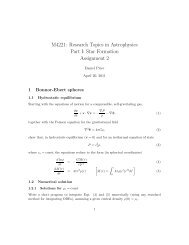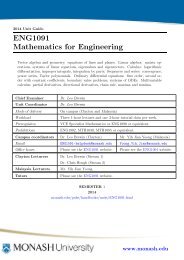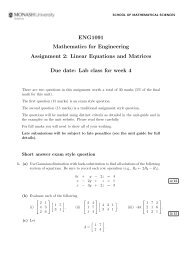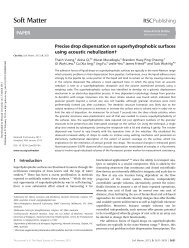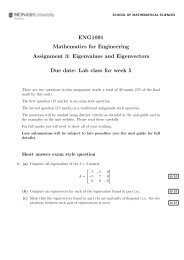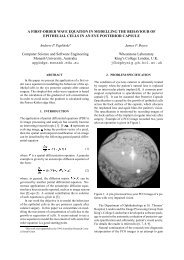MTH3051 Introduction to Computational Mathematics - User Web ...
MTH3051 Introduction to Computational Mathematics - User Web ...
MTH3051 Introduction to Computational Mathematics - User Web ...
Create successful ePaper yourself
Turn your PDF publications into a flip-book with our unique Google optimized e-Paper software.
School of Mathematical Sciences<br />
Monash University<br />
What more do we need <strong>to</strong> make this code work?<br />
We need values for a,b and c. This is easy – we simply include lines like a = 2; b =<br />
1; c = 5; before the above pair of lines.<br />
What can go wrong with this code?<br />
We might encounter complex roots. Though Matlab can handle complex numbers (without<br />
any fuss) we’ll declare (for this example) that complex roots are forbidden. So we<br />
need <strong>to</strong> avoid computing the square root when b 2 − 4ac < 0. This we do by using an if<br />
statement.<br />
Here is our updated code.<br />
a = 2; b = 1; c = 5;<br />
if ( b*b - 4*a*c >= 0 )<br />
r_1 = ( -b + (b*b - 4*a*c)^(1/2) )/(2*a) ;<br />
r_2 = ( -b - (b*b - 4*a*c)^(1/2) )/(2*a) ;<br />
end<br />
Notes<br />
◮ The ; also allows us <strong>to</strong> put more than one expression on each line.<br />
◮ The if (...) and end lines define the block of lines <strong>to</strong> be executed only when<br />
b 2 − 4ac is greater or equal <strong>to</strong> zero.<br />
If we left the code as it is we could run in<strong>to</strong> another problem further down the track.<br />
How so?. Well, we have deliberately chosen (or forgotten?) <strong>to</strong> not set the values for r 1<br />
and r 2 in the case of complex roots. But what would happen if we tried <strong>to</strong> use r 1 and<br />
r 2 later, in some other part of the code? Heaven only knows what values would be used<br />
(never assume that a variable starts with an initial value of zero). Clearly we need <strong>to</strong><br />
provide values for r 1 and r 2 for all possible cases. Thus we modify the if statement<br />
as follows<br />
a = 2; b = 1; c = 5;<br />
if ( b*b - 4*a*c >= 0 )<br />
r_1 = ( -b + (b*b - 4*a*c)^(1/2) )/(2*a) ;<br />
r_2 = ( -b - (b*b - 4*a*c)^(1/2) )/(2*a) ;<br />
else<br />
r_1 = 0;<br />
r_2 = 0;<br />
end<br />
Note that setting r 1 = 0 and r 2 = 0 is mathematically wrong but at least we can<br />
now proceed with known values for r 1 and r 2. We could also use these zero values as<br />
16-Feb-2014 16



